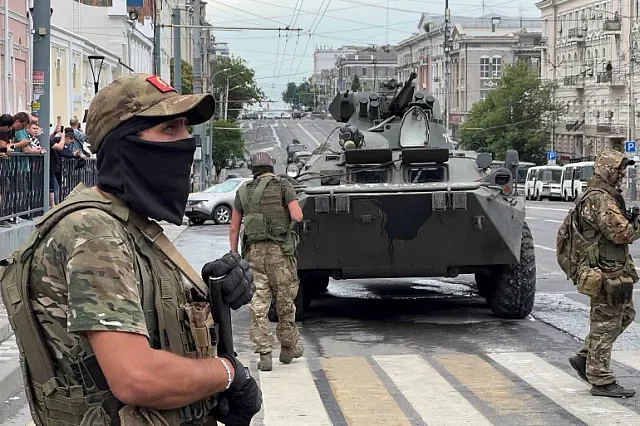
Wagner group, a fighter from the country’s mercenary supplier, which has taken part in the uprising against Russian President Vladimir Putin, said he and the fighters under his command had no idea what was happening at the time.
Within 24 hours Yevgeny Prigoshin, head of the Wagner Group, launched an armed uprising. Send fighters from the battlefields of Ukraine to the southern Russian city of Rostov. After taking control of the city, which is important for the Russian forces in the Ukraine war, Prigoshin pushed the fighters of Wagner further towards Moscow.
Bhagana’s fighters don’t usually talk to the media. However, BBC Russia was able to speak to a junior commander who happened to take part in the mutiny.
This commander named Gleb took part in the battle to capture the eastern city of Bakhmut, which has become a symbol of the war in Ukraine.
Gleb was resting with his troops at a barracks in the Russian-controlled Luhansk region of Ukraine when the uprising began. In the early hours of June 23, he received a call to join a fleet of Wagner fighters leaving Ukraine.
A Wagner commander gave this order. Gleb did not want to reveal the name of the commander considering the security issue. However, that commander Prigoshin and Wagner did the work according to the instructions of the command council.
That commander told Gleb, “It’s full deployment.” We’re going to build a fleet, let’s get out.’
Gleb said no one knew which way the fleet was heading. But he was surprised when he realized that they were withdrawing from the front battlefield.
This commander said that when Wagner’s fighters crossed the Russian border and entered the Rostov region, they did not face any resistance at all.
Recalling that moment, Gleb said, ‘I didn’t see any border guards. Of course, the traffic police saluted us on the whole journey.
Telegram (messaging app) channels closely associated with Wagner later claimed that border guards at the Bugayevka checkpoint surrendered their weapons when Wagner’s fighters arrived.
How to control buildings
Upon reaching Rostov-on-Don, Wagner’s fighters were ordered to surround all law enforcement buildings in the city and seize the military airport. Gleb’s unit was asked to take control of a regional office of the Russian intelligence agency Federal Security Service (FSB).
As they approached the building, it seemed completely locked and empty. A drone is flown to see if anyone is there. Finally, after half an hour a door opened and the two stepped out into the street.
I said, what is the deal here? This is our city.” He said, ‘So we just agreed that we will be separate from each other. They used to come to smoke sometimes.’
Rostov journalists reported that the situation was similar in other government buildings inside and outside the city. Wagner’s fighters first flew drones over these buildings and then surrounded them. However, food was allowed to be taken to the building.
There is no explanation
While all this was happening, Prigoshin was meeting with Deputy Defense Minister Lt. Gen. Yunus-Bek Yevkurov and Deputy Chief of the General Staff Lt. Gen. Vladimir Alekseyev at the headquarters of the Russian Army’s Southern Military District.
At the meeting, Prigoshin demanded that they hand over Army Chief Valery Gerasimov and Defense Minister Sergei Shoigu to him. While Prigoshin was in the meeting, another fleet of Wagner’s forces began to advance.
Gleb confirmed that the fleet was led by Vagnar founder Dmitry Utkin. The former Special Forces officer is rarely seen in public. Gleb said the fleet was on the main highway towards Voronezh and was apparently headed for Moscow.
So did Gleb know the plan—what Prigoshyn wanted to do or planned to do? He swore clearly that he did not know why these things were happening. “We knew what was going on from the telegram, just like you,” said Gleb.
As the day progressed, what was happening in Rostov spread around the world. Without giving him any explanation, he and his unit were told to return to their base in Luhansk. The future of Gleb and his unit is now uncertain. They have been told to stay at the barracks in Luhansk and await further instructions. Gleb’s simple answer to the question of why Wagner is not leaving is, ‘My contract has not expired yet.’